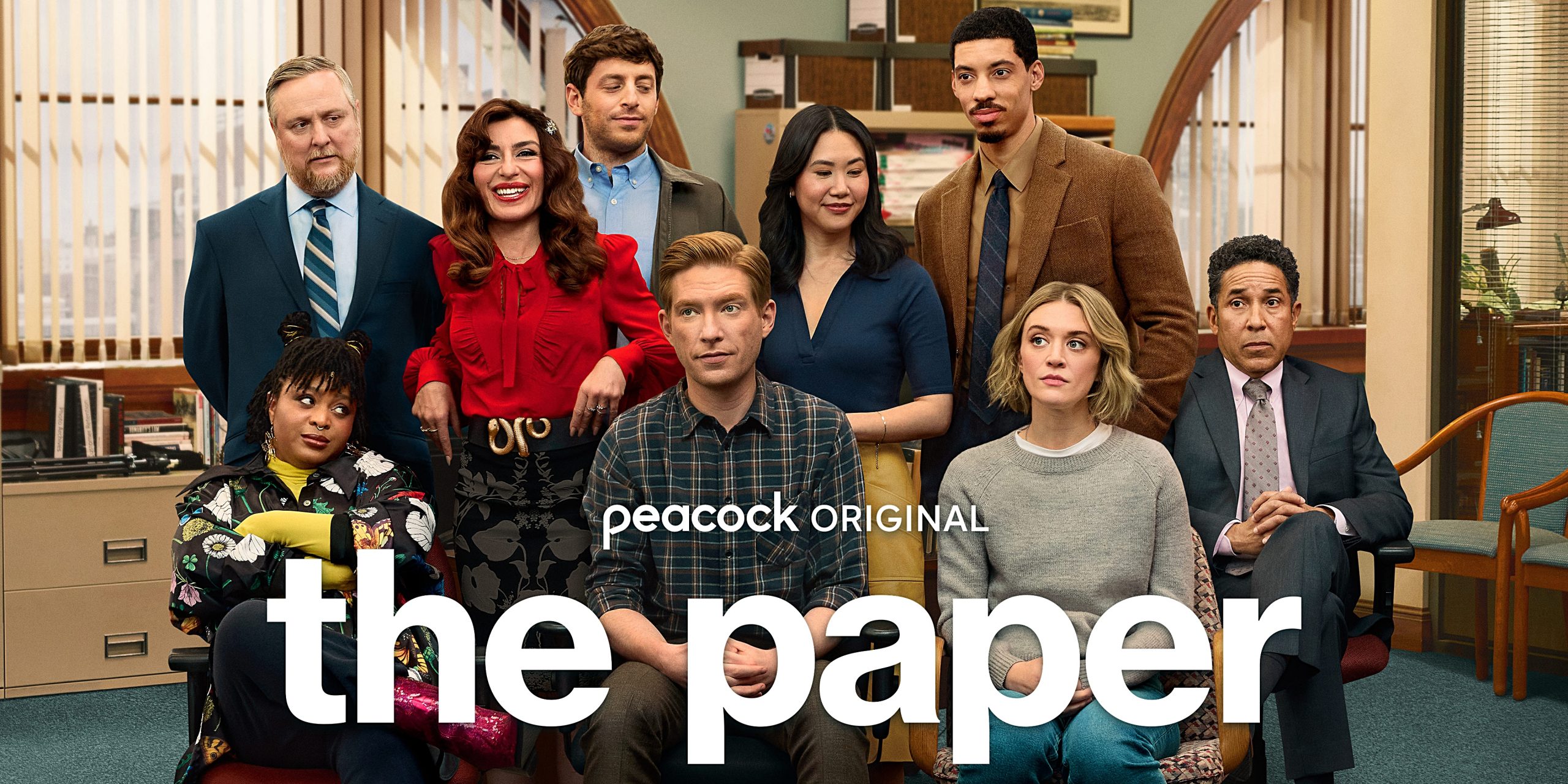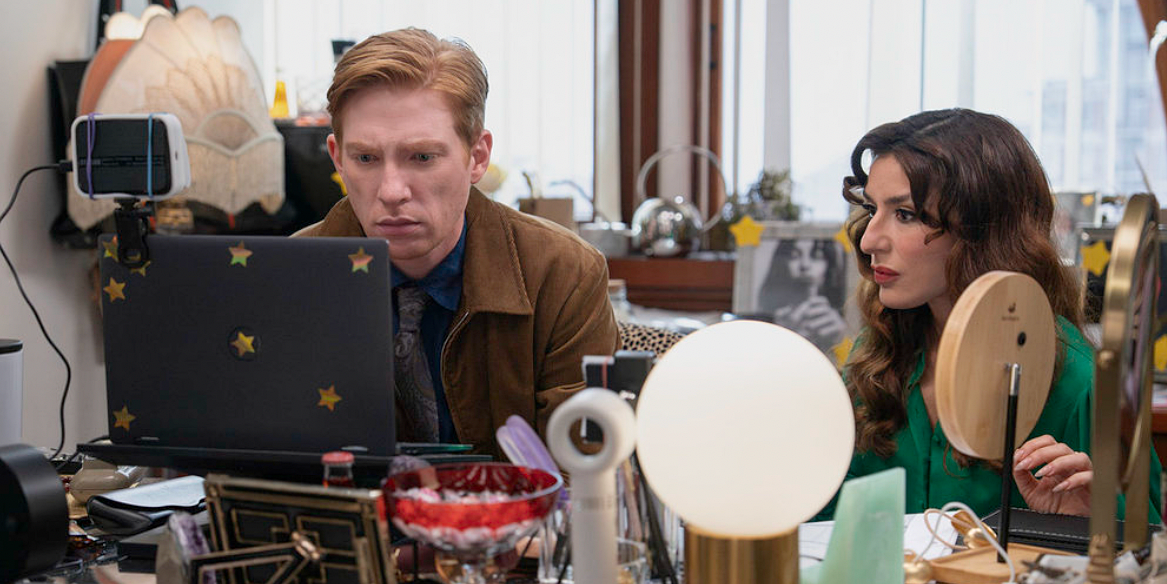THE STORY – Following up on the story from “The Office,” the documentary crew that immortalized Dunder Mifflin’s Scranton branch discovers a disappearing Midwestern newspaper and the publisher trying to revive it with volunteer reporters. This mockumentary follows the daily lives and struggles of dreamers in love with journalism, and their less-than-competent co-workers, trying to deliver accurate news without the resources or training to do a great job.
THE CAST – Domhnall Gleeson, Sabrina Impacciatore, Chelsea Frei, Oscar Nuñez, Ramona Young, Melvin Gregg, Tim Key, Alex Edelman & Gbemisola Ikumelo
THE TEAM – Greg Daniels & Michael Koman (Creators)
Are mockumentaries back? In a world as unsettled as ours in 2025, many of us (including myself) retreat to old, familiar comfort shows to ease anxiety and quiet the noise. But plenty of us hold these old comforts in sacred, almost deity-esque light. Much like “Seinfeld” and “Friends” before them, shows like “The Office (US),” “Parks & Recreation,” and “Brooklyn Nine-Nine” occupy an unspoken, almost sacred space when it comes to remakes — if it ain’t broke, don’t fix it. As hypocritical as it sounds to say “The Office” shouldn’t be remade, considering its source material, I’m sure I’m not alone in being wary of another rendition of a show so near and dear to our hearts. It’s with this skepticism that I entered into the first season of “The Paper.” While it doesn’t strike all the high notes of those that came before it, there’s an easy familiarity and sense of comfort that longtime fans will recognize, even if it never fully rises to their heights.
Created by Michael Koman and Greg Daniels — the latter, who’s the risky genius responsible for adapting “The Office” to US audiences — “The Paper” makes a strategic attempt to separate itself from its source material, but not enough to seem fresh out of the gate. No longer slinging office paper, employees of the company that purchased the now-defunct Dunder Mifflin sell anything that uses paper, including toilet and news varieties. Both Softees Toilet Paper and the Toledo Truth Teller, or TTT, share an office and management team that is inept, inexperienced, and unmotivated to drive any needed change. The only holdover from Dunder Mifflin is Oscar, and he’s used about as much as he was in the original series. There are a few references from his time at Dunder Mifflin, and one original cameo, but Daniels and Koman make it a point to establish “The Paper” in its own world, its own city, with its own quirky, subtly absurd group of employees.
The first few episodes rely too heavily on the exposition needed to develop lovable characters. Still, the season picks up steam in the second half once it settles in and decides who each of these characters is. Unfortunately, many of these characters, and even some plot points, feel recycled and stale from the mid-2010s mockumentary style shows we’ve come to know and love. The series’ comedic force is light and leans heavily on a few key players, including Tim Key as Ken Davies, the second-in-command eccentric and socially awkward leader, plagued by the gift of incessant chatter. If that sounds familiar, it’s because it’s a different flavor of the same utterly endearing character he played in “The Ballad of Wallis Island,” and you know what? It totally works. More Tim Key, please; he’s made for the “The Paper” world.
Making a sporadically humorous but generally awful pairing as Davies’s offbeat leader is Esmerelda Grand, played by Sabrina Impacciatore, whose name lives up to her demeanor. Grandiose and attention-seeking in all the wrong ways, Impacciatore’s narcissistic Grandiose attempts to steal scenes, but mostly becomes a distraction. When reserving a bit in the tank, she serves the ensemble better than trying to be the star of the show. Filling out the squad’s punchline player is Eric Rahill as Travis, used just sparingly enough not to overdo it, landing almost every joke he’s given.
The humor may leave you wanting more, but the heart lies with the straight-man characters in “The Paper.” Chelsea Frei plays Mare, or the Jim Halpert of this series, fully aware of her ridiculous surroundings yet unwilling to apply herself enough to get out of it. Frei sparks strong chemistry with both Ramona Young’s Nicole and Domhnall Gleeson’s Ned, a dynamic that deepens in the second half of the season, where the series puts most of its chips. The writers stake the anchor of the story on Gleeson’s Ned Sampson, the cautious yet ambitious newcomer to both Toledo and the TTT who, much like the writers themselves in the early episodes, isn’t quite sure what to make of it all. Gleeson falls into gentle familiarity by the end of the season, seemingly made to play the klutz of a man you just can’t help but root for.
As with the original US series (and many others), the first season is still trying to find its footing, even 10 episodes in. Unfortunately, we live in a world where patience is thin and decisions are made after a few short episodes, potentially dooming this series early on. Look what happened after the first season or two of series such as “Parks & Rec,” “Veep,” and, yes, “The Office (US).” A slow burn to start, but each show found its voice by evening out the tone, sharpening the jokes, and leaning into the soul of the series. The team behind “The Paper” only slightly learned from each of these: they might have recycled material, but you can already spot the same spark of heart and humor that powered the greats before it.
As an aging millennial in a daunting world, “The Paper” is a welcome sigh of relief. It rarely breaks convention, but try to give it the respect of those that came before it by sticking with it. Hopefully, it’s worth it, because lord knows we need it.
 THE GOOD – Well-acted and harkening on familiar beats that spark nostalgia. An easy, bingeable watch for those who miss the comedy of the past.
THE GOOD – Well-acted and harkening on familiar beats that spark nostalgia. An easy, bingeable watch for those who miss the comedy of the past.
THE BAD – Far from new and creative, many plot points and characters feel derivative from the peak of mockumentary-style television of the 2005-2015 era. Most jokes are met with slight giggles vs. laugh-out-loud, quotable lines like its predecessor.
THE EMMY PROSPECTS – None
THE FINAL SCORE – 6/10

